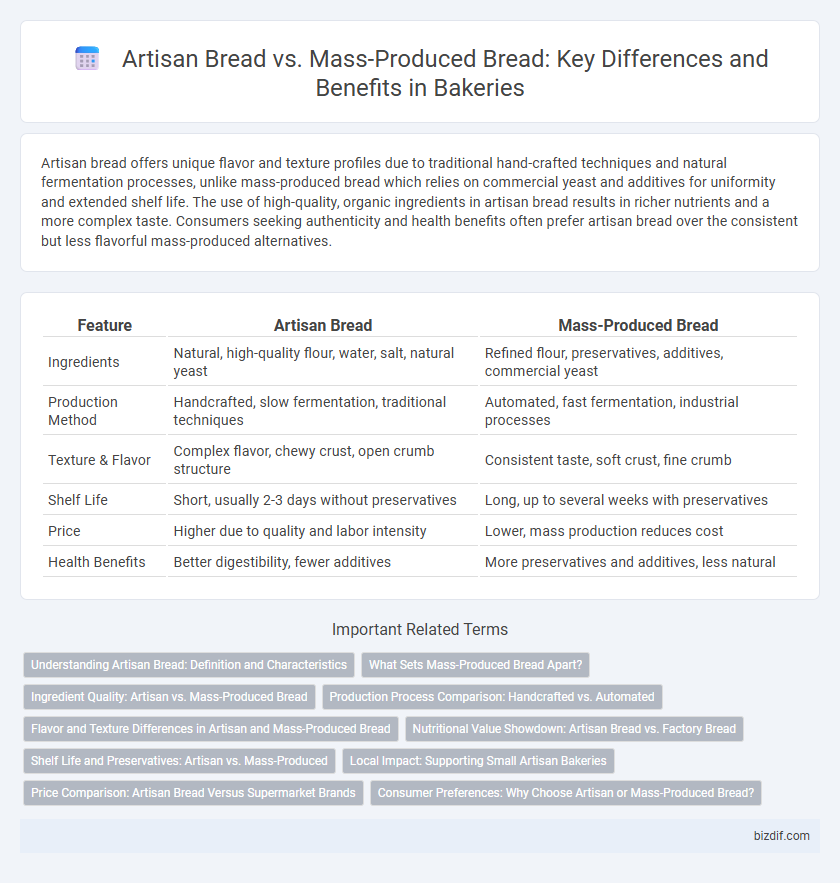Artisan bread offers unique flavor and texture profiles due to traditional hand-crafted techniques and natural fermentation processes, unlike mass-produced bread which relies on commercial yeast and additives for uniformity and extended shelf life. The use of high-quality, organic ingredients in artisan bread results in richer nutrients and a more complex taste. Consumers seeking authenticity and health benefits often prefer artisan bread over the consistent but less flavorful mass-produced alternatives.
Table of Comparison
| Feature | Artisan Bread | Mass-Produced Bread |
|---|---|---|
| Ingredients | Natural, high-quality flour, water, salt, natural yeast | Refined flour, preservatives, additives, commercial yeast |
| Production Method | Handcrafted, slow fermentation, traditional techniques | Automated, fast fermentation, industrial processes |
| Texture & Flavor | Complex flavor, chewy crust, open crumb structure | Consistent taste, soft crust, fine crumb |
| Shelf Life | Short, usually 2-3 days without preservatives | Long, up to several weeks with preservatives |
| Price | Higher due to quality and labor intensity | Lower, mass production reduces cost |
| Health Benefits | Better digestibility, fewer additives | More preservatives and additives, less natural |
Understanding Artisan Bread: Definition and Characteristics
Artisan bread is handcrafted using traditional methods, often involving slow fermentation and natural ingredients like flour, water, salt, and wild yeast. This type of bread features a crusty exterior, chewy texture, and complex flavor profile due to longer fermentation times and higher moisture content. Unlike mass-produced bread, artisan bread avoids preservatives, artificial additives, and rapid industrial processing, emphasizing quality and craftsmanship.
What Sets Mass-Produced Bread Apart?
Mass-produced bread is characterized by its consistent texture and extended shelf life achieved through additives, preservatives, and industrial baking processes. Unlike artisan bread, it is produced at a high volume using mechanized techniques that ensure uniformity and faster production times. This type of bread typically contains enriched flour and emulsifiers to maintain softness and improve appearance during transportation and retail display.
Ingredient Quality: Artisan vs. Mass-Produced Bread
Artisan bread is crafted with high-quality, natural ingredients such as organic flour, natural wild yeast, and minimal preservatives, which enhance flavor and texture. Mass-produced bread often uses refined flour, artificial additives, and preservatives designed for extended shelf life and consistent production. The superior ingredient quality in artisan bread contributes to better nutritional value and a richer, more complex taste profile compared to mass-produced varieties.
Production Process Comparison: Handcrafted vs. Automated
Artisan bread is crafted through a meticulous hand-kneading and slow fermentation process, employing natural starters such as sourdough to develop complex flavors and a chewy texture. In contrast, mass-produced bread relies on automated machines and chemical additives to expedite dough preparation and leavening, resulting in uniform loaves with a softer crumb. The handcrafted approach prioritizes quality ingredients and traditional techniques, whereas industrial production emphasizes speed, consistency, and cost efficiency.
Flavor and Texture Differences in Artisan and Mass-Produced Bread
Artisan bread boasts a complex flavor profile derived from long fermentation times and natural sourdough cultures, resulting in a tangy taste and crisp, chewy crust. Mass-produced bread often lacks this depth due to rapid production processes and the use of commercial yeast, leading to a softer texture and milder flavor. The texture of artisan bread is characterized by an open crumb structure with irregular holes, contrasting with the uniform, dense crumb of mass-produced loaves.
Nutritional Value Showdown: Artisan Bread vs. Factory Bread
Artisan bread contains higher nutritional value due to natural fermentation processes that increase beneficial probiotics and enhance nutrient absorption, unlike mass-produced bread that often contains preservatives and refined ingredients. Whole grains and minimal processing in artisan bread contribute to higher fiber and vitamin content, improving digestion and overall health. Factory bread typically has added sugars and fewer nutrients, making artisan bread a superior choice for those seeking nutrient-dense options.
Shelf Life and Preservatives: Artisan vs. Mass-Produced
Artisan bread typically has a shorter shelf life due to the absence of preservatives and reliance on natural fermentation processes, which promote freshness but lead to quicker staling. Mass-produced bread contains additives and chemical preservatives such as calcium propionate that extend shelf life by inhibiting mold growth and delaying crumb firming. The trade-off involves artisan bread offering superior taste and texture at the expense of longevity, while mass-produced varieties prioritize durability and convenience for longer storage.
Local Impact: Supporting Small Artisan Bakeries
Supporting small artisan bakeries significantly boosts local economies by creating jobs and promoting sustainable practices within the community. Artisan breads, made with traditional methods and high-quality ingredients, foster a deeper connection between consumers and local producers compared to mass-produced bread. Emphasizing locally sourced grains and maintaining small-scale production preserves regional food heritage and reduces environmental impact.
Price Comparison: Artisan Bread Versus Supermarket Brands
Artisan bread typically commands a higher price than mass-produced supermarket brands due to its use of premium ingredients and traditional baking methods. While supermarket breads are produced in large quantities with cost efficiency, artisan loaves offer unique flavors and textures that justify their premium cost. Consumers seeking quality and authenticity often accept the price difference between artisan bread and mass-produced options.
Consumer Preferences: Why Choose Artisan or Mass-Produced Bread?
Consumers favor artisan bread for its superior texture, complex flavors, and use of natural ingredients, which appeal to those seeking a gourmet, handcrafted experience. Mass-produced bread attracts buyers with its affordability, consistent quality, and longer shelf life, making it ideal for daily consumption and convenience. Preference often hinges on lifestyle priorities, with artisan bread appealing to health-conscious or food-enthusiast consumers and mass-produced bread suiting budget-conscious or time-sensitive shoppers.
Artisan Bread vs Mass-Produced Bread Infographic

 bizdif.com
bizdif.com